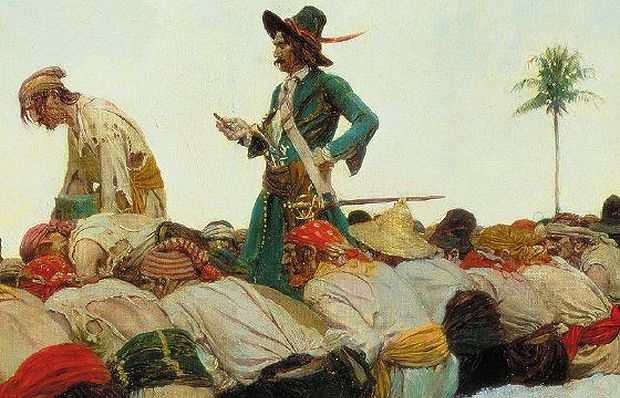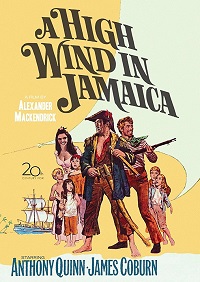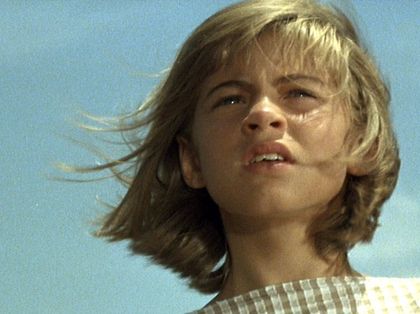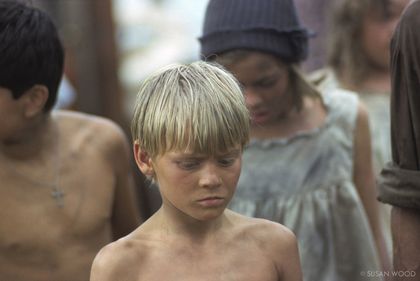The story of “A High Wind in Jamaica” (Richard Hughes, 1929) might sound like a comedy, but it is in fact a drama of great cruelty, capable of making the skin of most insensitive readers crawl.
 This novel dismantles the myth of the innate goodness of humans.
This novel dismantles the myth of the innate goodness of humans.
Of all the myths of the Enlightenment, none enjoys such good health as that of the innate goodness of Man. Nowadays, claiming anything different comes close to sacrilege.
The Welsh writer Richard Hugues (1900-1976) set himself the challenge of debunking this idea in his novel “A High Wind in Jamaica” (1929).
It which was masterfully made into a film by Alexander Mackendrick in the 1960s, starring Anthony Quinn and James Coburn.
 A great film adaptation of the book was made in the 1960s.
A great film adaptation of the book was made in the 1960s.The novel tells of the adventures of a group of children sailing to England to attend a British school. Shortly after setting off on their voyage, they are captured by a band of pathetic pirates, who have managed to survive on the coasts of Cuba until the reign of Queen Victoria. The sea and life on board ship are the scenery for the melancholic satire of a group of pirates who end up becoming the victims of their little passengers. The story might sound like a comedy, but it is in fact a drama of great cruelty, capable of making the skin of most insensitive readers crawl.
A HIGH WIND IN JAMAICA
The book can be read as an adventure story, but the surprising thing is its perfect analysis of child mentality: the capacity that children have to live in the present; their sense of justice, but also their cruelty and egocentrism. The author studied at Oxford, where he graduated in 1922. He travelled in North America and the Caribbean, writing in literary reviews. During the Second World War, he worked at the office of the Admiralty. He spent the last years of his life working as a Sunday Times correspondent in Hong Kong. He wrote poetry, theatre, children’s books and novels, but his most famous book was A High Wind in Jamaica, which was published in 1929.
The film is equally impressive, classically structured with three well-defined acts. The first recounts the episode of the hurricane that destroys the Thorton house in Jamaica, obliging the children to leave for England. In the second, the ship is boarded by pirates, who imprison the children without however wishing to hurt them. In the last, following a chain of unexpected events, the pirates are captured and executed, falsely accused by the children, who do nothing to save them.
 Emily, one of the characters in the film.
Emily, one of the characters in the film.Anthony Quinn gives one of his best performances as Captain Juan Chávez, who bounces around the ship like a child, laughing and drinking, while the little Emily (played by the debutant Deborah Baxter, before her role in The Wind and the Lion of John Milios) never drops her British introspective cool. In the middle of it all is Zac, the mysterious James Coburn, moves around like a cat, acting like a spectator who knows that he is witnessing the end of an era, and can do nothing to prevent it. In the silent duel between Chávez and Emily, the outcome seems inevitable.
SUPPOSED INNOCENCE
The crudeness of this story debunks the myth of children’s supposed innocence and it does so in a sober and unadorned way, which is both distant and cruel, in line with the strange logic of the children in the story. The film is told from the point of view of one of the girls, Emily, while the book is narrated from the perspective of the omniscient narrator. The facts are analysed under a microscope, extracting their consequences, but at the end, the author admits that he is powerless to penetrate the secrets of human nature.
The film ends with the girl playing with her brothers next to a lake, as she watches a toy boat being carried away by the current. It is the symbol of lost innocence.
 The Bible teaches clearly about the original sin.
The Bible teaches clearly about the original sin. No one can deny the tragedy that the Bible calls sin. It is the origin of death (Romans 5: 12–14). If children are innocent, then why do they die? We are born with a nature that is irresistibly bent towards sin. We can paint a pretty picture of supposed innocence, but we are fooling ourselves when we idealize childhood as a time that is free from shadows. The truth is that children are not angels. In the Bible, David recognises the sin that has been in his life since birth (Psalm 51:5).
The presumption of those that deny original sin is that guilt requires the clear and deliberate use of a person’s will. However, the Bible however has a much wider understanding of sin. There are sins of omission (James 4:17) and unconscious sins that also require God’s forgiveness (Psalm 19:12), since they are under his judgement (1 Corinthians 4:4). The Law requires that sacrifices be made to atone for them (Numbers 15:27). We are “by nature deserving of wrath” (Ephesians 2:3), but “If we confess our sins, he is faithful and just and will forgive us our sins and purify us from all unrighteousness.” (1 John 1:9).

Las opiniones vertidas por nuestros colaboradores se realizan a nivel personal, pudiendo coincidir o no con la postura de la dirección de Protestante Digital.
Si quieres comentar o